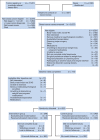Results of the Exercise and Nutrition to Enhance Recovery and Good Health for You (ENERGY) Trial: A Behavioral Weight Loss Intervention in Overweight or Obese Breast Cancer Survivors
- PMID: 26282657
- PMCID: PMC4582146
- DOI: 10.1200/JCO.2015.61.1095
Results of the Exercise and Nutrition to Enhance Recovery and Good Health for You (ENERGY) Trial: A Behavioral Weight Loss Intervention in Overweight or Obese Breast Cancer Survivors
Abstract
Purpose: Obesity increases risk for all-cause and breast cancer mortality and comorbidities in women who have been diagnosed and treated for breast cancer. The Exercise and Nutrition to Enhance Recovery and Good Health for You (ENERGY) study is the largest weight loss intervention trial among survivors of breast cancer to date.
Methods: In this multicenter trial, 692 overweight/obese women who were, on average, 2 years since primary treatment for early-stage breast cancer were randomly assigned to either a group-based behavioral intervention, supplemented with telephone counseling and tailored newsletters, to support weight loss or a less intensive control intervention and observed for 2 years. Weight and blood pressure were measured at 6, 12, 18, and 24 months. Longitudinal mixed models were used to analyze change over time.
Results: At 12 months, mean weight loss was 6.0% of initial weight in the intervention group and 1.5% in the control group (P<.001). At 24 months, mean weight loss in the intervention and control groups was 3.7% and 1.3%, respectively (P<.001). Favorable effects of the intervention on physical activity and blood pressure were observed. The weight loss intervention was more effective among women older than 55 years than among younger women.
Conclusion: A behavioral weight loss intervention can lead to clinically meaningful weight loss in overweight/obese survivors of breast cancer. These findings support the need to conduct additional studies to test methods that support sustained weight loss and to examine the potential benefit of intentional weight loss on breast cancer recurrence and survival.
Trial registration: ClinicalTrials.gov NCT01112839.
© 2015 by American Society of Clinical Oncology.
Conflict of interest statement
Authors' disclosures of potential conflicts of interest are found in the article online at
Figures
Comment in
-
Reply to W. Hryniuk et al.J Clin Oncol. 2016 Apr 1;34(10):1153. doi: 10.1200/JCO.2015.65.7049. Epub 2016 Jan 25. J Clin Oncol. 2016. PMID: 26811516 No abstract available.
-
Psychiatric Disorders Impeding Weight Loss in Obese Breast Cancer Survivors.J Clin Oncol. 2016 Apr 1;34(10):1152-3. doi: 10.1200/JCO.2015.65.5639. Epub 2016 Jan 25. J Clin Oncol. 2016. PMID: 26811517 No abstract available.
References
-
- Siegel R, Ma J, Zou Z, et al. Cancer statistics, 2014. CA Cancer J Clin. 2014;64:9–29. - PubMed
-
- American Cancer Society. Cancer Treatment and Survivorship Facts and Figures 2014-2015. Atlanta, GA: American Cancer Society; 2014.
-
- Protani M, Coory M, Martin JH. Effect of obesity on survival of women with breast cancer: Systematic review and meta-analysis. Breast Cancer Res Treat. 2010;123:627–635. - PubMed
-
- Khaodhiar L, McCowen KC, Blackburn GL. Obesity and its comorbid conditions. Clin Cornerstone. 1999;2:17–31. - PubMed
-
- Centers for Disease Control and Prevention. Overweight and obesity. http://www.cdc.gov/nccdphp/dnpa/Obesity/



